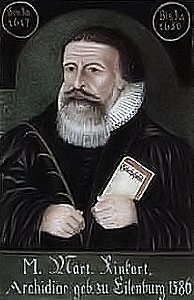Introduction
Born: April 23, 1586, Eilenburg, Saxony.
Died: December 8, 1649, Eilenburg, Saxony . A memorial tablet was affixed to his house on Easter Monday, April 26, 1886.
Buried: Stadtkirche, Eilenburg, Saxony.

Born: April 23, 1586, Eilenburg, Saxony.
Died: December 8, 1649, Eilenburg, Saxony . A memorial tablet was affixed to his house on Easter Monday, April 26, 1886.
Buried: Stadtkirche, Eilenburg, Saxony.

After attending the Latin School at Eilenburg, Rinkart became, in November 1601, a foundation scholar and chorister of the St. Thomas School in Leipzig.
This scholarship also let him proceed to the University of Leipzig, where he enrolled for the summer session of 1602 as a theology student.
After completing his studies, he stayed for some time in Leipzig (he did not take his master’s degree until 1616). In March 1610, he offered himself as a candidate for the post of diaconus at Eilenburg, and was presented to the Town Council.
However, the Superintendent refused to sanction the arrangement, nominally on the grounds that Rinkart was a better musician than theologian, but really because he was unwilling to have a strong willed colleague who was native of Eilenburg.
So instead, Rinkart took a position at the Eisleben Gymnasium in June 1610, also serving as cantor at St. Nicholas Church. After a few months, he became diaconus of St. Anne’s Church in the Neustadt of Eisleben.
He became pastor at Erdeborn and Lütjendorf, near Eisleben, in 1613. In 1617, he became archdiaconus at Eilenburg.
Rinkart was a voluminous writer and a good musician. Among other things, he wrote a cycle of seven dramas (comedies
), suggested by the centenary of the Reformation in 1617.
His hymns appeared mainly in: